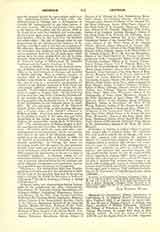

Chichele (or CHICHELEY), HENRY, Archbishop of Canterbury, b. at Higham Ferrers, Northamptonshire, England, 1362; d, at Oxford, April 12, 1443. He was the son of Thomas Chichele, a yeoman, and Agnes, daughter of William Pyncheon. Educated by William of Wykeham at St. John the Baptist’s College, Winchester, he passed from there to New College, Oxford. He took the degree of B.C.L. in 1389-90, and the degree of LL.D. in 1396. Llanvarchall, in the Diocese of St. Asaph, was his first living, and he held in succession the rectory of St. Stephen’s, Walbrook, the archdeaconry of Dorset, together with a prebend of Salisbury (1397), a canonry in the collegiate church of Aberguilly (1400), a canonry of Lichfield (1400), the archdeaconry of Salisbury (1402), the chancellorship of Salisbury, together with the living of Odiham in the Diocese of Winchester (1403), and the livings of Melcombe and Sherston in the Diocese of Salisbury. Following upon these came his appointment by provision to the Bishopric of St. David by Gregory XII, who consecrated him at Lucca (June 17, 1408).
Early in his career he was admitted an advocate in the Court of Arches and for a time acted as the lawyer for Richard Mitford, Bishop of Salisbury. His skill in legal matters attracted the king’s notice, and in July, 1405, he was sent with Sir John Cheyne on a mission to Innocent VII. Later in the same year he treated with the King of France as a commissioner of peace, and in 1407 he journeyed again to Italy on an embassy to Gregory XII, then at Siena. It was on this occasion that he received the Bishopric of St. David from the pope, with the king’s approval. He was again in Italy at the Council of Pisa (1409), and it was not until May, 1411, that he first visited his diocese and was enthroned. The Diocese of St. David must have seen very little of him, for he went as king’s ambassador to France with the Earl of Warwick in 1413, and early in the following year, on the death of Arundel, the king nominated him to the See of Canterbury (February 19, 1414), to which he was elected on the 4th of March. As arch-bishop he was the king’s trusted friend and councillor. He seems to have favored the policy of war with France, collecting much money for its support; in 1419 and again in 1420 he accompanied Henry V into France. A keen and skillful lawyer, he was active in all legislative matters, particularly with regard to ecclesiastical affairs, and vigorous in searching out and suppressing the Lollards. His loyalty to the pope’s policy of opposing the statutes of Provisors and Praemunire has been doubted; the opponents of the Catholic Church have looked upon him as the upholder of the independence of the national Church against the claims of Rome. He certainly displeased Martin V, who slighted him by offering a cardinal’s hat and the powers of a legate a latere to Henry Beaufort, Bishop of Winchester. The pope again passed him by in 1439, when Kemp, Archbishop of York, was created cardinal and given precedence over him in Parliament in spite of Chichele’s appeal against such treatment. On two occasions, in 1421 and 1422, Martin V severely reprimanded Chichele for his weakness in not procuring the abolition of the obnoxious statutes. The pope charged him with hindering the liberties of the Church, and suspended him from the office of legate which pertained to his see. Though he appealed from the pope to the judgment of a future council we find him submitting to the pope’s wishes and endeavoring to persuade the Commons to cease withstanding the pope (1428).
Chichele was a munificent benefactor to his birth-place, his university, and his cathedral church. At Higham Ferrers he built and endowed a college for eight priests, four clerks, and six choristers; he founded also a hospital there for twelve poor men. He gave two hundred marks for the relief of poor students at Oxford; this sum was preserved in a chest known as “Chichele’s Chest”. To New College he gave a similar sum of money. He built the Cistercian College of St. Bernard, now St. John’s, Oxford, but his greatest work for his university was the foundation of the College of All Souls for a warden and forty fellows, who were to spend their time in prayer and study. His name is still perpetuated in Oxford, for the one who fills the chair of modern history is known as the “Chichele Professor”. The last years of his life were chiefly spent at Oxford superintending his great foundation there. Old age and infirmity prompted him to suggest his resignation to the pope (1442), but before the necessary arrangements could be made he died.
G. E. HIND

